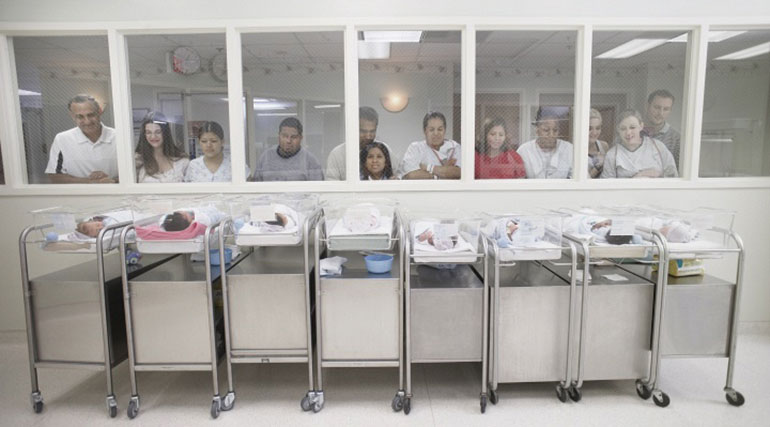When parents adopt domestically, their family’s beginning is often at a hospital — where they meet their newborn son or daughter for the first time. This “hospital experience” is an important part of the family’s adoption story. Careful planning and preparation will ensure that the wishes of all those involved, birth parents and adoptive parents, are respected and carried out — and that time spent together at the hospital will be remembered fondly.
Before the birth
The hospital should be notified of the adoption as far in advance of the birth mother’s due date as possible. You should inform the hospital soon after you match with a birth mother. In an independent adoption, the birth mother’s attorney usually makes initial contact with the hospital. In an agency adoption, communication is usually initiated by the social worker who has been guiding and counseling the birth mother. Your primary contact at the hospital will most likely be a staff social worker assigned to labor and delivery.
The hospital adoption process can be different for every hospital; they should provide their written instructions to the attorneys or agencies involved. Review the written policy carefully, so that you will be aware of what can or cannot be done at the hospital.
[Free Webinar: Baby Care Basics for Adoptive Parents]
Well before her due date, the birth mother should speak with the social worker or her attorney about how much contact she wants to have with the adoptive parents and the child after birth, who can accompany her in the delivery room, and how long she’d like to stay in the maternity ward following delivery. If you’d like to stay at the hospital following the child’s birth, ask in advance whether this can be arranged.
It is also important to know the hospital’s policies regarding adoptive parents’ access — to the baby in the nursery and to his or her medical records. Most U.S. hospitals grant parents adopting a newborn access in both respects, provided that proper forms have been completed. The birth mother’s attorney or social worker should request any forms that can be completed in advance of the delivery.
At the hospital
Provided that you’ve been granted access to the baby, you’ll get the same ID wristbands as the birth parents. This should let you move freely through the maternity ward, to see the birth mother (if you’ve agreed on contact) and to see your baby in the nursery.
Every child born in a U.S. hospital undergoes newborn health screenings. The baby will also be examined by a pediatrician prior to discharge. (You may be able to arrange for a pediatrician of your choosing to conduct this examination.) You’ll receive all of the baby’s medical records provided that the birth mother has executed a valid medical release form. The hospital may request your insurance information, so that the baby’s medical bills can be submitted in a timely manner.
[10 Lists to Help You Prepare for Adoption]
In many instances, the birth mother and birth father execute their consent to adoption, or relinquishment of parental rights, at the hospital. The attorney or agency representative should coordinate with the hospital social worker to ensure an appropriate setting. If a notary is required, the hospital may assist you in finding one.
During her hospital stay, the birth mother will be asked to complete an application form for a birth certificate. She may select a first and middle name for the child, or may put down the first and middle names selected by the adoptive parents. After the adoption is finalized, the original birth certificate will be sealed and a new birth certificate, with the full name given by the adoptive parents, will be created. At that time, the adoptive parents can request copies of the new birth certificate from the vital records office of the state where the child was born.
The home stretch
The baby’s discharge plan should be discussed well before the due date. The plan will involve a number of factors, including the wishes of the involved parties, hospital policy, and state law. It’s often the birth mother’s wish that she not carry the baby out of the hospital. Many hospitals will agree to discharge the baby directly to the adoptive parents or to the agency’s representative. If the hospital insists on releasing the baby to the birth mother, you may be able to reach a compromise whereby a third party, such as a relative, an attorney, or an agency social worker, takes custody.
Some states require independent adopters to obtain temporary legal custody of the child prior to taking physical custody. In those instances, you must seek a court order while the baby is still in the hospital. That custody order will be presented to the hospital at the time of discharge.
[Free Download: Infertility and Adoption Guide]
During the baby’s stay at the hospital, the adoptive parents and the birth parents share a unique moment in their lives. Careful advance planning, as well as an appreciation for flexibility, will ensure an intimate and joyful experience.
Adoption Agencies with U.S. Newborn Adoption Programs
See all adoption agencies with U.S. newborn adoption programs >


